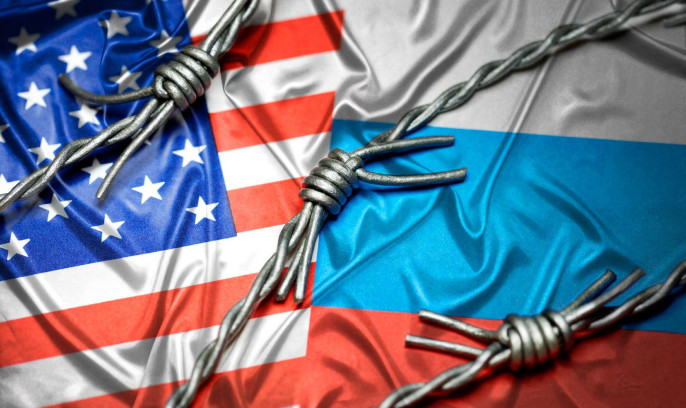Pompeo’s Plan To Recognize Taiwan’s Sovereignty May Spark Conflict in Taiwan Strait
The security conflict between Russia and NATO has intensified because of the discord in eastern Ukraine. Despite efforts to alleviate tension, the U.S.-China relationship has worsened. With the international community drawing analogies between Ukraine and Taiwan, the people of Taiwan are even more worried about cross-strait relations. However, the Taiwan Strait is not the Black Sea, and Chinese President Xi Jinping is certainly not Russian President Vladimir Putin. You would be hard-pressed to predict the U.S.-Japan alliance's response to a clash between China and Taiwan by looking at the situation in Ukraine.
Though the U.S. supports the security of its NATO allies, Biden is still unwilling to send troops to Ukraine's aid. During the Cold War, the U.S. and USSR went 40 years without direct combat. But as Russia's replacement of the Soviet Union was unable to resolve the security quandary between Russia and Europe, ultimately NATO's eastern expansion prompted Putin to draw a line in the sand over Ukraine. Not only did Putin firmly oppose Ukraine joining NATO, but he also ordered a military invasion of his country's western neighbor, bringing the U.S. and Russia as close to war as two sides can get.
Biden is cautious about sending troops into Ukraine because he wants to avoid pushing all of humankind into war; doing so would bring "the long peace," which has lasted since the end of World War II, to a sudden close. If the U.S.-Russia conflict evolves into a multinational war in Europe between NATO and Russia, "Pax Americana" will certainly be relegated to the history books. Allowing war is absolutely not in America's strategic interests, and the Biden-led U.S. political establishment won't be anyone's cat's paw and launch a hasty military intervention in Ukraine.
The Taiwanese government — both major parties — and the Taiwanese people alike welcomed Biden's unofficial delegation. The delegation's visit can convey a clearer foreign policy signal via direct dialogue between the U.S. and Taiwan; in addition, it can prevent a miscalculation in the Taiwan Strait while the Russia-Ukraine conflict continues to expand. But during his visit to Taiwan, Pompeo seemed to strike a different tone from that of the incumbent Biden. Pompeo also revealed a strategy unlike that of the U.S. political establishment.
Pompeo criticized Biden for his "strategic ambiguity" on Ukraine, which the former believes encouraged Russia's invasion.* He also urged the U.S. to recognize the reality of the sovereignty of the Republic of China (Taiwan); this, he believes, is the only way to achieve so-called clarity. Pompeo also noted that perhaps some will see his proposed course of action as provocation. However, Pompeo argued that the way to truly provoke a powerful country is to reveal a lack of resolution: The absence of determination gives bullies an opening.
Since Pompeo's remarks in Taipei were obviously outside the bounds of the Three Joint Communiqués and the Taiwan Relations Act, it would likely be challenging to adopt his proposal as part of America's future policy toward China. Even if Republicans retake the reins of government, or further — even if Pompeo becomes the next president — it's unlikely that the U.S. will use diplomatic recognition of the Republic of China (Taiwan) to play hardball with Beijing.
Pompeo believes diplomatic recognition of Taiwan's sovereignty is unrelated to the island's future: It is, in his view, the acknowledgment of an apparent truth. But if the U.S. officially recognized Taiwan's independence, America would pay an enormous price in its diplomatic dealings with China. Plus, America wouldn't make Taiwan, or East Asia as a whole, any safer by pursuing this policy. Beijing's approach to Taiwan is flexible, but its red line is clear. Pompeo's plan to establish diplomatic ties with both the People's Republic of China and the Republic of China (Taiwan) might give Beijing a pretext to use military force against Taiwan; this would achieve nothing except to ignite a conflict in the Taiwan Strait.
It's impossible to predict whether the U.S.-Japan alliance would intervene in a conflict between China and Taiwan. However, one thing is certain: If conflict erupts, Taiwan will be pushed toward war. Maybe Pompeo wants to take out two opponents in one fell swoop, making China and Russia both targets of a blockade by Western countries and causing the world to descend into a second cold war, thereby allowing the U.S. to maintain its current status. But China is certainly not Russia. Russia's economic dealings with the West are primarily based on energy, while China has exceedingly complex trade relations that span the entire globe. In the short term, Western nations can foot the bill for significant increases in the price of energy and raw materials resulting from sanctions on Russia. However, cutting ties with China's market, thus forcing a reboot of globalization, is a different story altogether. There are likely few countries that would want to follow the U.S. down that path.
The author is a distinguished professor in the Department of Japanese Language and Culture at Fu Jen Catholic University in Taiwan. He is also the director of the school's Center for Japan and East Asia Studies.
*Editor's Note: This quotation, accurately translated, could not be verified.

